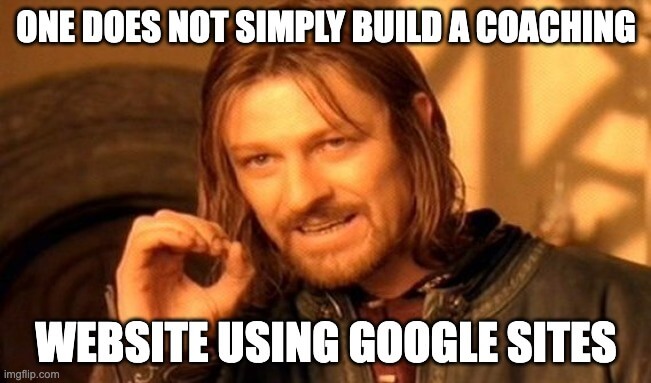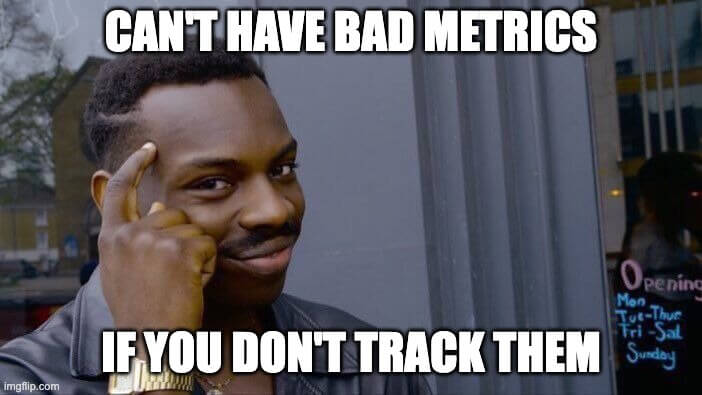Andy Griffiths turned $500 into a $108,000/year coaching business.
Fed up with the limitations of in person coaching and disappointed with the impersonal nature of online fitness programs, Andy saw an opportunity.
With his $500 investment and a desire to help more folks, Andy turned his small personal training business into something huge.

He created Expert PT, a bespoke online coaching service that puts real support and personalization first.
Now his business makes $108,000 a year and he gets to impact hundreds of lives beyond the 4 walls of a physical gym.
Source: Starter Story
Coaching In a Nutshell
Though not everyone will become the next Andy Griffiths, coaching is a fun and rewarding profession.
Coaching is where experts in specific areas guide others to achieve personal or professional goals. Imagine having a personal trainer for your life — someone who helps you set goals, design a plan and motivate you to overcome obstacles.
As a coach you get to empower your clients to be the best version of themselves by giving them the tools and support.
Coaching isn’t about giving advice — it’s about facilitating growth and development.
A coach helps clients identify their strengths, clarify their goals and create an action plan to achieve them. This personalization is what makes coaching so powerful for real change.
Why Start a Coaching Business?
Flexibility
One of the best things about coaching is the ability to set your own schedule. Whether you want to work from home or travel, coaching allows you to work from anywhere with an internet connection. Perfect for those who want a better work life balance.
Fulfilment
Coaching gives you immense personal satisfaction as you see your clients achieve their goals and transform their lives.
The joy of helping others succeed can be incredibly fulfilling, coaching is more than a job — it’s a purpose driven career. Seeing clients overcome obstacles and hit milestones gives you a sense of achievement that few other careers can match.
Growing demand
The coaching industry is growing, valued at around $15 billion. As more people understand the value of personal development the demand for coaching services across all niches is increasing.
This is an opportunity for coaches to build a successful business. Whether it’s individuals looking to advance their career or businesses looking to improve team performance the need for skilled coaches is growing.
Revenue
Coaching businesses can make big money. On average coaching businesses make $3.12 million a year. This is serious money especially for established businesses with a solid client base.
Return on Investment (ROI)
According to Metrix Global, the ROI for coaching services is huge. Companies that invest in executive coaching can see returns of up to 788%.
Types of Coaching
Coaching covers many areas, each for different client needs:
Career Coaching
Career coaches help individuals navigate career transitions, identify their strengths and achieve professional growth. They provide guidance on resume building, interview preparation and career planning. Career coaches help clients align their work with their passions and skills so they get more job satisfaction.
Health Coaching
Health coaches help clients improve their physical wellbeing through lifestyle changes. They support clients in areas such as nutrition, exercise, stress management and chronic disease prevention. Health coaches help clients make sustainable changes to their life.
Life Coaching
Life coaches help clients achieve personal growth and life satisfaction by setting and achieving personal goals. They work on areas like relationships, self confidence and time management. Life coaches help clients create a balanced and fulfilling life.
Business Coaching
Business coaches work with entrepreneurs and executives to develop business strategy and management. They provide insight into leadership development, team building and operational efficiency. Business coaches help organisations improve performance and achieve their goals.
Executive Coaching
For leaders to develop leadership skills, improve decision making and address specific issues in their role.
Relationship Coaching
To help individuals and couples build healthy and happy relationships by improving communication, resolving conflicts and intimacy.
Mindset Coaching
To change thought patterns and beliefs to achieve personal and professional goals by developing a growth mindset and overcoming mental blocks.
Spiritual Coaching
Works with clients who want to connect with themselves deeper through practices like meditation or reiki to find their inner self and inner peace.
Parenting Coaching
Supports parents at all stages of family life to help them navigate the challenges of raising children and create a harmonious family environment.
Financial Coaching
Helps clients achieve financial freedom by making informed decisions and planning for the future.
Each type of coaching is for a specific audience and requires a different approach and expertise. By specialising in a particular area coaches can provide more focused and effective support.
Benefits for Clients
Goal Achievement
Coaches help clients set realistic goals and develop an action plan to achieve them. By breaking down big goals into smaller steps clients can make progress every week. This structured approach increases the chances of success.
Safe Space
Coaching provides a space for clients to explore challenges and opportunities without being critiqued. This safe space allows open conversation and builds trust between coach and client. Clients feel heard and understood which is the foundation of a good coaching relationship.
Skill Development
Coaches give clients the tools and techniques to develop their skills and self belief. Whether it’s communication skills or emotional intelligence coaching helps clients grow personally and professionally. These new skills can be applied to many areas of life.
Finding Your Coaching Niche

Choosing the right niche is crucial:
Choose a Lucrative Niche
Focus on areas that solve specific problems. Examples are career changes or health improvements. Align your niche with your passion so it’s genuine and sustainable. A niche that resonates with you will keep you engaged and interested.
Test Your Niche’s Viability
Research your potential clients’ needs and financials. Ask yourself: Who is my target market? What are their pain points? How can I help them achieve their goals? This will help you build a business model that works.
Unique Selling Proposition (USP)
Hyper focus on one pain point in your niche. Showcase your expertise to stand out from others. Your USP should clearly state what you do differently and why clients should choose you over others.
Coaching Expertise
To be a good coach you need to get the right training and skills:
Choose Accredited Training Programs
Choose programs accredited by well known bodies like the International Coaching Federation (ICF). Look for courses that combine theory with practical application as hands on experience is key to developing your skills.
Get Advanced Certifications
Boost your credibility by doing workshops that offer Continuing Coach Education (CCE) credits. Certifications add to your credentials and give you a deeper understanding of advanced coaching techniques.
Build a Track Record and Empathy
Offer free sessions first to get testimonials and build a track record. Empathy is key to building trust with clients; it allows you to connect with them deeply and see things from their perspective. By showing you care and understand them you build relationships that last and client success.
Business Plan
A business plan is the backbone of a coaching business. This plan outlines how your business will work and make money. Think of it as a roadmap for your decisions and strategies.
Vision and Mission
Start by defining what you want to achieve with your coaching business. Your vision is the outcome and your mission is how you will get there.
Target Market
Who is your ideal client? What are their demographics, pain points and challenges? This will help you tailor your services to their needs.
Services
Define the services you will offer. One on one coaching, group sessions or workshops? What formats and topics will you cover.
Financial Goals
Set achievable financial targets for your business. How much do you need to earn to cover costs and be profitable.
Marketing
How will you get clients? Online marketing, social media, networking events, partnerships?
Flexibility
Keep your business plan flexible. As you get feedback and experience be prepared to adjust your strategies to new opportunities or challenges.
Business Structure

Choosing the right structure is important for asset protection and tax benefits:
Sole Proprietorship: This is the simplest structure where you own and run the business alone. Easy to set up but no personal liability protection.
Partnership: If you’re starting the business with someone else a partnership might be suitable. Shared ownership and responsibilities.
Limited Liability Company (LLC): An LLC gives you liability protection while allowing flexible management structures. Popular among small business owners for its simplicity and protection.
Corporation: This structure gives you strong liability protection but has more complex rules and higher taxes. Used by larger businesses.
Research the pros and cons of each to decide which is best for you.
Registering Your Business
Once you’ve chosen your structure do this to make your business official:
Choose a Business Name: Choose a name that resonates with your target market and your brand. Make sure it’s unique and not already in use.
Register Your Business Name: Depending on where you are in the world register your business name with the relevant government department. This varies by country and state.
Get an Employer Identification Number (EIN): An EIN is a unique number assigned by the IRS for tax purposes. You need it to open a business bank account and file taxes.
Online Coaching Business
A strong online presence is essential in today’s digital world:
Create a Professional Website

Your website is the first point of contact for potential clients. Use platforms like WordPress or Squarespace to build a site that shows your services, testimonials and contact details.
Create Compelling Content
Write clear messaging that answers key questions: What do you do? How can you help clients? What makes you different from other coaches? Use blog posts, videos or podcasts to provide value and position yourself as an expert in your niche.
Set Up Payment Systems
Use PayPal or Stripe to make transactions easy. Clients should be able to pay for services online with no hassle.
Scheduling Tools
Use Calendly or Acuity to simplify appointment booking. These systems allow clients to book sessions at their convenience, reducing admin for you.2
Client Relationship Management (CRM)
A CRM helps you manage client interactions:
Store Client Info: Store contact details, session notes and communication history. Have all client info in one place.
Automate Tasks: Automate sending appointment reminders or follow up emails. Saves time and consistency with clients.
By getting these basics right you’ll have a solid foundation for your coaching business to grow and client happiness.
Your Coaching Program
A coaching program is more than just giving advice; it’s about creating a whole plan that meets your clients needs. Here’s how to build a program:
Define Goals and Objectives
Start with what you want your clients to achieve through your program. Are you helping them with their career, health or personal growth? Clearly defined goals will shape your program.
Know Your Client
Do surveys or interviews to know the specific challenges and needs of your target market. This will help you tailor your program to those needs.
Program Structure
Decide on the format of your sessions—will they be one-on-one, group sessions or workshops? How often and how long will they be? A structured program keeps clients engaged.
Content and Resources
Create worksheets, guides and exercises to support your coaching sessions. These should support learning and give clients something to use outside of sessions.
Feedback Mechanisms
Allow clients to give feedback on the program. This will help you make changes and keep the program relevant and effective.
Coaching Sales Page
A sales page is the key to converting visitors into clients. It must communicate the value of your coaching:
Compelling Messaging
Use simple and clear language that explains the benefits of your program. How does it solve the problem for your potential client?
Testimonials and Social Proof
Show success stories from past clients to build credibility. Testimonials can make a big difference to potential clients’ decisions.
Call to Action (CTA)
Ask visitors to take action, whether it’s to book a free consultation or buy a coaching package. Make sure your CTA is clear and easy to follow.
Use a Cart/Checkout Tool
Use a tool that make taking payments easy. Offer them the flexibility to pay via credit card or PayPal to boost conversions. One such tool that lets your customers choose how they want to pay is our very own CartMango.
creating sales client intake forms easy. These tools will simplify the process and look professional.
Pricing

Pricing your services right is key to getting clients and profitability:
Research Competitors: Know what other coaches in your niche are charging. This will give you a benchmark.
Know Your Target Market’s Budget: Know what your potential clients are willing to invest in themselves. Pricing should reflect the value you offer but be affordable.
Costs and Expenses: Make sure your pricing covers all business expenses, including materials, marketing and admin costs. Balance is key between affordability for clients and sustainability for your business.
Getting Coaching Clients
Once your program is live, focus on getting clients:
Content Marketing
Share content around your niche through blogs, videos or podcasts. This will position you as an expert and attract potential clients looking for guidance in those areas.
Social Media
Use platforms like LinkedIn or Instagram to reach a broader audience. Share insights, tips and success stories around your coaching niche with followers.
Networking Events
Attend industry events or webinars where you can meet potential clients or partners. Relationships built in these spaces can lead to client referrals.
Free Workshops or Webinars
Offer free sessions to demonstrate your expertise and give potential clients a sneak peek into what they can expect from your paid services.
Maintain Good Relationships With Clients
Client relationships are key to long term success:
Be Empathetic and Responsive: Show you care about your client’s progress by listening to their concerns and giving feedback.
Ongoing Support: Offer resources and tools to help clients succeed beyond coaching sessions. This could be follow up emails, extra reading or access to online communities.
Celebrate Successes: Acknowledge and celebrate your client’s successes. This will reinforce their progress and motivate them to keep working towards their goals.
Now you have a program and marketing in place you can get and keep clients who want to work with you.
Marketing

Having a marketing strategy is crucial to growing your coaching business. It’s about reaching your target market and building your brand. Here’s how:
Online Presence
Have a professional website and active social media profiles. Use platforms like LinkedIn, Instagram and Facebook to reach your audience. Share content around your target market. Regular updates and engaging posts will keep your audience interested and informed about your services.
Content Marketing
Create and share content that demonstrates your expertise. This could be blog posts, videos, podcasts or webinars. Sharing useful information will position you as an expert in your niche and attract potential clients. For example if you’re a career coach you might write articles about resume writing tips or interview preparation strategies.
Email Marketing
Use an email marketing tool to build an email list to stay in touch with potential and existing clients. Send newsletters with tips, updates and promotions to keep your audience engaged. Personalized emails will make clients feel valued and more connected to your brand.
Networking
Attend industry events, conferences and webinars to network with other professionals. Relationships built in these spaces can lead to referrals and partnerships. Networking also gives you the opportunity to learn from others in the industry and stay current.
Paid Advertising
Consider using paid advertising on platforms like Google Ads or Facebook Ads to reach a broader audience. Targeted ads will help you connect with people interested in your services by targeting specific demographics or interests.
Growth
New Services
Introduce new services or products that complement your existing offerings. This could be online courses, workshops or group coaching sessions. Diversifying your services will allow you to serve different client needs and create more income streams.
Raise Prices
As you gain more experience and credibility consider raising your prices to reflect the value you deliver. Make sure your prices remain competitive while supporting business growth. Communicate the price increase to clients clearly so they can trust you.
Hire a Team
If demand is more than you can handle on your own, consider hiring other coaches or administrative staff. Delegating tasks will allow you to focus on high value activities like client interaction and program development. Having a team will also allow you to offer more services.
Technology
Use platforms like Thinkific or Teachable to create full-blown online courses. These tools will allow you to reach a broader audience without the limitations of one-on-one sessions. If your needs are simpler, you can use CartMango.
Self Development
Personal development is essential to stay current in the coaching industry:
Workshops and Conferences
Attend events that will give you insight into the latest coaching trends and techniques. Networking at these events will also give you valuable connections that can lead to new opportunities.
Courses
Take courses that will improve your skills and knowledge. Whether it’s learning new coaching modalities or mastering digital marketing, continuous learning will keep you ahead of the curve. Consider courses that offer industry recognised qualifications or credentials.
Books
Stay current by reading books on coaching, business development and personal growth. Books will give you different perspectives and strategies to spark innovation in your business. They will also give you practical tips you can use in your coaching sessions.
Challenges
Running a coaching business has its own set of challenges but being prepared will help you overcome them:
Finding Clients
Attracting clients is often the biggest challenge. Focus on building a strong online presence and leverage word of mouth referrals from happy clients. Offer free introductory sessions or workshops to attract new clients by giving them a taste of what you offer.
Reputation
Credibility takes time. Deliver high quality services consistently and get testimonials from happy clients to build your reputation. Ask happy clients to leave reviews on Google or Yelp.
Financials
Keep track of income and expenses. Use financial software or hire an accountant to manage your finances accurately. Review financial reports regularly to make decisions on investments or cost cutting.
Success Metrics

Measuring the success of your coaching business means:
Financial Metrics: Monitor revenue, profit margins and return on investment (ROI) regularly. These will give you insight into your business. Knowing these will help you know where to improve or grow.
Client Satisfaction: Get feedback from clients through surveys or reviews. High satisfaction means you’re delivering great service and can lead to repeat business or referrals. Use feedback to improve your services.
Business Growth: Measure growth by looking at client acquisition rates, service expansion and market reach. Growth means your strategies are working to attract new clients and retain existing ones.
By having a marketing strategy, scaling smart, investing in self development, overcoming challenges and measuring success… you can have a coaching business that exceeds client expectations.

FAQ
Is a coaching business profitable?
Yes, as mentioned above — the coaching business is valued at around $15 billion. On average, coaching businesses can make $3.12 million a year.
What type of coaching makes the most money?
Executive coaching is where coaches make the most money. This niche is working with senior management, executive staff and highly skilled workers. And the companies these people work in — they usually have a huge budget to spend for executive coaching.
What is the success rate of businesses that get help from coaching?
According to Metrix Global, the ROI for coaching services is huge. Companies that invest in executive coaching can see returns of up to 788%.
What’s the first step of coaching?
Determine what kind of audience/niche you want to serve. A good way is to ask yourself:
What am I good at
What am I passionate about
Then find the intersection of the above and research if there’s already a successful coaching business serving that audience.
If there is, it’s almost certain that it’s a profitable niche. If not, you might want to explore other niches.
How do I start my first coaching session?
Set clear objectives of what the client wants to achieve. Then break down the objectives into smaller milestones. From there, map out what needs to be done by when to hit the milestones.
Sources
- Starter Story: Andy Griffiths
- Imgflip for the pictures
Related Reading
- SamCart vs Sellfy: the customer cash hostage (2026)
- Payhip vs ThriveCart: losing what you built (2026)
- ThriveCart vs Gumroad: the recurring revenue trap (2026)
- Where to Buy Digital Products to Resell: 6 Top Places in 2026 (+ a glaring problem)
- SamCart vs Gumroad: who actually owns your customers? (2026)
- Is Gumroad Safe in 2026? Uncovering the Hidden Pros and Cons
- Payhip vs Podia: The Recurring Income Hostage (2026)
- Payhip vs SamCart: The Recurring Revenue Handcuffs (2026)
- SamCart vs ClickFunnels: The Recurring Revenue Hostage (2026)
- SendOwl vs ThriveCart: Which has a hidden trap in 2026?
As You Grow Your Coaching Business…
As you grow your coaching business, the right tools make all the difference in simplifying and maximizing your profits.
That’s where CartMango comes in — a fast, conversion boosting cart for solo coaches and course creators like you.
By simplifying the checkout and giving your clients a smooth buying experience, CartMango lets you get back to what you do best — coaching.
Ready to level up? Find out how CartMango can help your sales today. It’s free to try.
